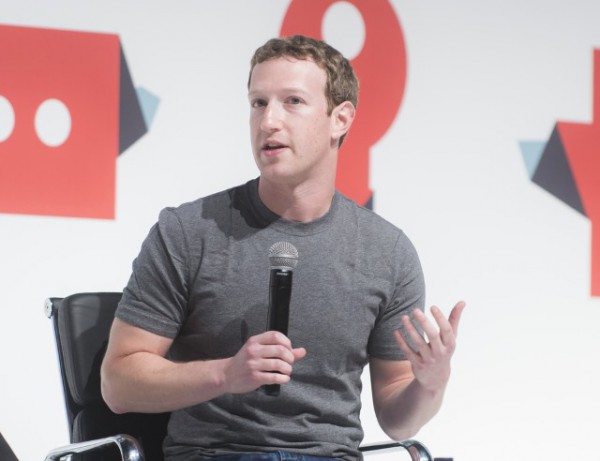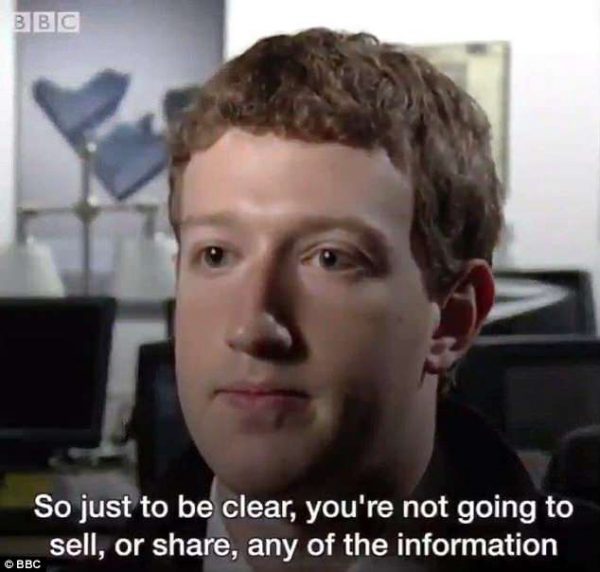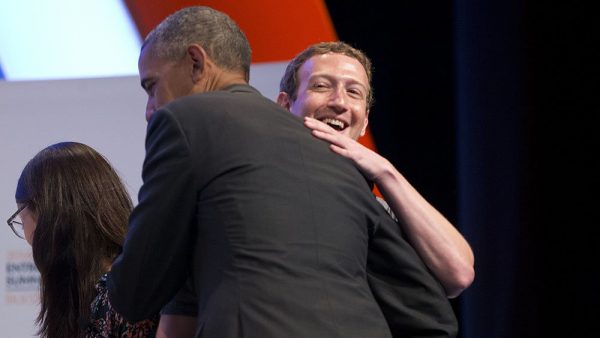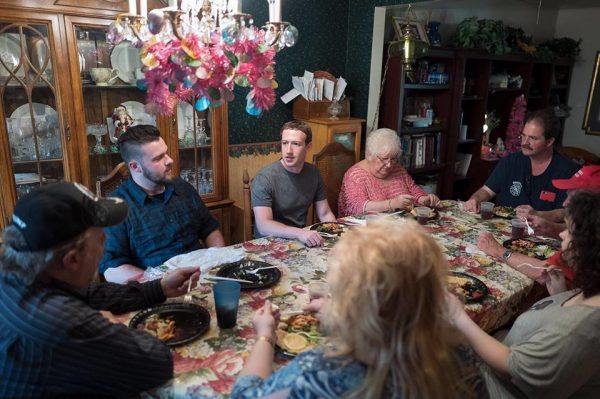Crony Capitalism: Zuckerberg and the never-ending stench of Facebook

Taken at face value as an isolated incident, Facebook's most recent data breach leak allegations may seem like a plausible case of corporate malfeasance. But that's giving Zuckerberg way too much credit, as someone who has been gifted every olive branch possible from his global community of users. And yet one who has consistently, and awkwardly, dropped the ball each time. Are we dealing with a case of a CEO who can't keep the wheels straight? Or is there more going on behind the veil then anyone wishes to admit?
I've been pondering this question more and more recently. It seems like Facebook can't go more than a few months without another bullet that needs to be dodged. It used to be that Facebook was navigating user blowback due to feature changes. But it's quickly getting into incessant hot water about privacy blunders and functional changes purely centered on being able to siphon every last drop of data out of users.
I've previously raised my concerns with the dangers of allowing entities like Facebook so much weight in public discourse and overall entry in our daily lives. One of my core complaints a few years back was that Facebook's actions are creeping closer and closer to having the clout to follow what China has already implemented in its Social Credit System. While Facebook hasn't reached that level of Orwellian nightmare (yet), the encroachment of a reality around Corporate "Thought Policing" seems to be a logical slippery slope.

Facebook CEO Mark Zuckerberg claimed in a 2009 interview that 'Facebook will never sell your information without consent.' In light of revelations that firms connected to supporting the Trump 2016 and Obama 2012 campaigns were given paid access to large sums of data, Mark is now being forced to recant his broken promises. (Image Source: DailyMail)
As much as Facebook should be held to a high standard of data security and privacy in general, due to its assumed stewardship in charge of swathes of information, how can anyone be surprised at what is going on? On the one hand, legions of users seem to show outrage over each misstep in how personal data is handled, but on the other... they log on the next day, and continue Liking, Sharing, and Streaming more of the same, turning a blind eye towards the latest minefield Facebook execs are tiptoeing.
Add in the rumors that Zuckerberg may have intentions to run for office -- with the hiring of pollsters and cheesy staged photo ops across America -- and one can see why connecting the dots here is more important than isolating each breach of trust independently.
And I know very well why they give Zuckerberg a free pass. "Because" their family is on Facebook and they can easily catch up on that baseball game they couldn't attend. "Because" photos of that awesome night out their friends were on got posted and they needed to comment. "Because" everyone else is plastered to this platform. The reasons are endless, and Zuckerberg did exactly what he set out to do: hook everyone and make it seem like going back to a pre-Facebook lifestyle was incomprehensible.
Facebook and Its 'De Facto Good' Mission
Having a concrete corporate vision that is grounded in honest, attainable beliefs is the ideal platform of any good company. But what happens when this mission leaves the realm of reality and enters the outright creepy? Facebook was just outed as crossing this line in the sand.
The news is lighting up in the last few days about an internal memo from within Facebook from back in June 2016 that paints the picture about just how twisted the lines of morality and technological dominance have become at the social media giant. Facebook Vice President Andrew Bosworth made some reference in his memo that, for anyone not working at Facebook, would surely raise some eyebrows:
"We connect people. Period. That’s why all the work we do in growth is justified. All the questionable contact importing practices. All the subtle language that helps people stay searchable by friends. All of the work we do to bring more communication in... So we connect more people.. That can be bad if they make it negative. Maybe it costs someone a life by exposing someone to bullies... Maybe someone dies in a terrorist attack coordinated on our tools.”
Make no mistake about it, Facebook has been consistently backing its product as the pre-eminent platform for social connection that fosters safe communities, healthy relationships, and puts people in touch in ways that were unheard of just 20 years ago. But public perception may have easily been duped by Facebook's now-admitted ulterior motives, as Boz put it himself in the memo:
“The ugly truth is that we believe in connecting people so deeply that anything that allows us to connect more people more often is *de facto* good. It is perhaps the only area where the metrics do tell the true story as far as we are concerned... That isn’t something we are doing for ourselves. Or for our stock price (ha!). It is literally just what we do. We connect people. Period.”
Lack of filters that prevent shades of gray from being realized have helped spawn some of the worst abuses in human history. While Facebook can't be placed on any such pedestal, such purity and dedication to a single mission at any cost may rear its ugly head at some point. I find Bosworth's comments quite ironic in some ways, especially since Facebook has taken heat for questionable censorship practices in the past. If the company believes its technology has this stated 'de facto good', why is it employing censors to begin with? If, as Bosworth said, "Maybe someone dies" due to their platform, why is hate speech or content deemed offensive the target of Facebook's internal filters?
The bigger question I'm begging here is just this: If we know the guiding vision of the executive team in charge of the flagship, how do we trust Facebook's public stances on what they will or won't do to censor speech, content, or connections they don't agree with? If they've admitted to allowing the platform to be an accessory to terrorists as a casualty of adhering to an idealistic vision, what principles does their big red pen follow and with what oversight?

Think the Trump campaign was the only beneficiary of Facebook's lax data privacy practices? Guess again. It was recently revealed that the Obama re-election campaign in 2012 used data that was extracted with similar tactics. Either Facebook is profiteering mightily from its now exposed practices, or it's guilty of gross incompetence spanning many years already. Any way you spin it, this reeks of Crony Capitalism. (Image Source: Investor's Business Daily)
There is no practical way to make easy sense of Facebook's claim to being a platform of 'de facto good'. Technologies based on open standards, with transparency and oversight, and with interoperability built in from the start, are about as close to items as one can call 'de facto good'. Examples include the internet, email, blockchain, the PSTN calling system, SMS, and similar technologies.
Facebook represents none of these ideals as a closed source platform, with zero open interoperability, along with censorship principles and privacy initiatives that flutter in the wind as political winds change. Facebook as a technology is merely a means to an end of upholding a concentrated user base, upon which Facebook can squeeze out endless data points from to cover its bottom line.
As a corporate vision, Zuckerberg has got it right. But to go so far as give his platform equal footing with a moral baseline is a step into the land of insanity and outright dishonesty.
Zuckerberg For Office: How He'd Win The Data War Without Even Trying
Political campaigning in the digital age has forced the arm of every candidate to get serious about winning the data war. While smaller campaigns have limited funds for such operations, US Presidential campaigns have war chests that clamor to be spent.
So it's no surprise that data related to people's social networking has become the big ticket. The problem? Facebook's public comments about its relationships with data profiteering have been quite contrary to recent revelations. While Cambridge Analytica has been hot press for many weeks about its efforts to help Trump in 2016 with data grabs via Facebook, the Obama reelection campaign in 2012 took advantage of very similar holes in Zuckerberg's datacenters.
One thing to keep in mind about this latest dustup at Zuckerberg's empire is that what these campaigns siphoned off is only a limited subset of what Facebook's servers contain. I would likely guess a very, very small crumb compared to what analytics their platform can internally deduce from your usage.
The level of powerful accuracy in predictions about users that they may not explicitly share with the network is becoming scary. This was already proven by studies as far back as 2013 that even then, peoples' Likes and the underlying patterns around them gave Facebook enough ammo to come to many conclusions with surprising veracity.

Facebook CEO Mark Zuckerberg claims he is on a nationwide tour to "fact find" and discover the truth about his own country. He claims there are no political ambitions behind this roadshow. But even seemingly casual sit downs with average Americans like this photo shows are backed by former Secret Service bodyguards, handfuls of aides, and a professional photographer sitting in the shadows just beyond the camera's view. Would you trust he wouldn't back his own Presidential campaign against the vast data oceans contained at Facebook? (Image Source: Business Insider)
For example, algorithms from the study proved to be 88% accurate for determining a male's sexuality. The same algorithms showed a 95% accuracy in being able to distinguish African-American from Caucasian-American users. Further, there was a 85% accuracy for being able to tell if someone is Republican or Democrat, with substance abuse being correctly predicted at an accuracy of 65% to 73%.
One has to wonder how precise these same big data algorithms have become since 2013's analysis. Zuckerberg has been hiring legions of additional engineers, and his platform has had another five years of usage from which to bloat his 'data oceans' upon. If you thought what Cambridge Analytica extracted was bad, can you imagine what a political campaign would do if it had unlimited access to this dataset with zero cost of entry?
Oh, like if someone that was considered a powerful insider at Facebook would run for office?
Oh, like a Mark Zuckerberg?
How convenient. Someone who consistently claims they have no political ambitions as of now. But he's also the same person who is accepting every chance possible to sit down for staged photo ops with "regular folks" (note: if you don't believe me, you can see one such collection of some of these awkward pit stops). He's also someone so obsessed with his own approval ratings that there are hired guns roving over this data full time for Mark. I have yet to see this be a common course for any other public and opinionated CEOs.
And based on data from the 2013 Cambridge University study on social media prediction accuracy, Facebook's big data machinations by the time a 2020 run would materialize would be absolutely killer for a FB insider like Mark. His access to data that could help reach potential voters would be unparalleled to anything seen in history -- unlike any dataset which any other campaign before it has ever even dreamed of having.
If the Cambridge University conclusions are to be believed, Mark could potentially combine what Facebook knows back to voter rolls that either major party already houses in databases. He could launch targeted advertising online with print ads and mailers which could presumably pull at the heart strings of issues for individual voters. This may even be powerful enough to target different issues to different voters within a home, all based on Like history and other connections you have on your Facebook account.
And imagine what he could do on the Facebook accounts of users who made public affiliations to vote against him. "Scrubbed" feeds, or tactics known formally as "Shadow Banning" (that has been exposed by former Twitter employees already) would be able to filter out what users both see and also what kind of reach they had for shared content. Facebook could empower a potential Zuckerberg campaign by using moral sliders in its terms of service to arbitrarily filter out competing campaign messages, shares, groups, and anything else that wouldn't fit.
And why should we be so naive to believe Zuckerberg wouldn't dig into his treasure chest of big data? If murder is considered something as a potential accepted casualty from Facebook and it's 'de facto good', then political campaigning surely could be considered a moral reality, too.
I'm not here to speak for or against a Mark Zuckerberg political campaign. Until he has a platform with positions and an announced candidacy, much of this is merely speculation.
But from all the dots whose connections are slowly fading into focus, how can the average person not be concerned here? You have a social media behemoth that internally sees all growth of its platform as being 'de facto good' even if it leads to loss of life. This same organization has been exposed as mishandling data profiteering efforts time and time again. And the leader of this corporation is taking numerous public strides that look like a burgeoning political campaign in all but name.
This isn't just dirty business that Facebook is engaging in. It's downright #CronyCapitalism at its finest.
Photo credit: catwalker / Shutterstock
 Derrick Wlodarz is a seasoned IT Specialist who owns Des Plaines, IL (USA) based Managed IT Service firm FireLogic. He has 12+ years of IT industry experience across the private and public sectors, with numerous technical credentials from Microsoft, Google, and CompTIA. He specializes in providing SMB clients with managed IT support, consulting, and training. Derrick is a long-serving member of CompTIA's Subject Matter Expert Technical Advisory Council that shapes the future of CompTIA exams across the world. You can reach him via email at [email protected].
Derrick Wlodarz is a seasoned IT Specialist who owns Des Plaines, IL (USA) based Managed IT Service firm FireLogic. He has 12+ years of IT industry experience across the private and public sectors, with numerous technical credentials from Microsoft, Google, and CompTIA. He specializes in providing SMB clients with managed IT support, consulting, and training. Derrick is a long-serving member of CompTIA's Subject Matter Expert Technical Advisory Council that shapes the future of CompTIA exams across the world. You can reach him via email at [email protected].